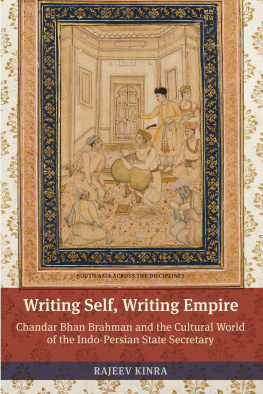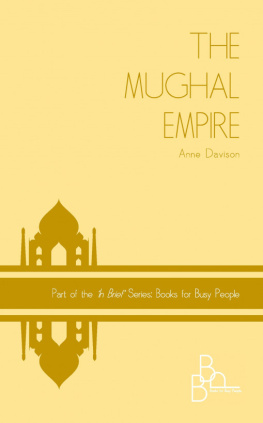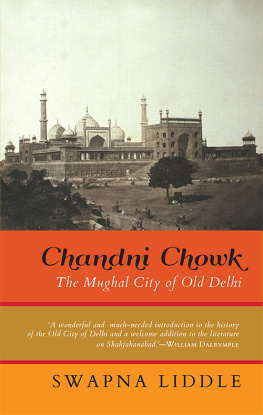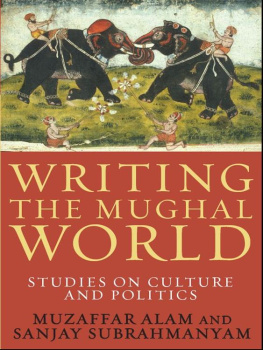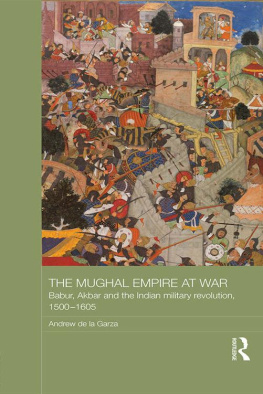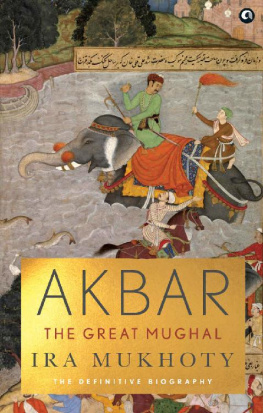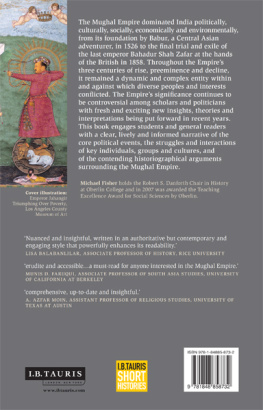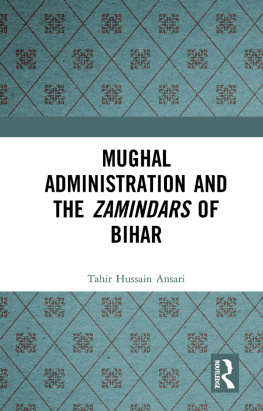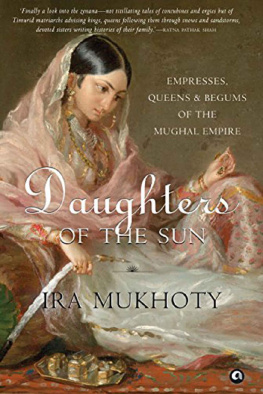Luminos is the open access monograph publishing program from UC Press. Luminos provides a framework for preserving and reinvigorating monograph publishing for the future and increases the reach and visibility of important scholarly work. Titles published in the UC Press Luminos model are published with the same high standards for selection, peer review, production, and marketing as those in our traditional program. www.luminosoa.org
Writing Self,
Writing Empire
SOUTH ASIA ACROSS THE DISCIPLINES
Edited by Muzaffar Alam, Robert Goldman, and Gauri Viswanathan
Dipesh Chakrabarty, Sheldon Pollock, and Sanjay Subrahmanyam, Founding Editors
Funded by a grant from the Andrew W. Mellon Foundation and jointly published by the University of California Press, the University of Chicago Press, and Columbia University Press
For a list of books in the series, see page 353.
Writing Self, Writing Empire
Chandar Bhan Brahman and the Cultural World of the Indo-Persian State Secretary
Rajeev Kinra

UNIVERSITY OF CALIFORNIA PRESS
University of California Press, one of the most distinguished university presses in the United States, enriches lives around the world by advancing scholarship in the humanities, social sciences, and natural sciences. Its activities are supported by the UC Press Foundation and by philanthropic contributions from individuals and institutions. For more information, visit www.ucpress.edu.
University of California Press
Oakland, California
2015 by The Regents of the University of California
This work is licensed under a Creative Commons CC-BY-NC-ND license. To view a copy of the license, visit http://creativecommons.org/licenses.
Suggested citation: Kinra, Rajeev. Writing Self, Writing Empire: Chandar Bhan Brahman and the Cultural World of the Indo-Persian State Secretary . Oakland: University of California Press, 2015. doi: http://dx.doi.org/10.1525/luminos.3
Library of Congress Cataloging-in-Publication Data
Kinra, Rajeev, author.
Writing self, writing empire : Chandar Bhan Brahman and the cultural world of the Indo-Persian state secretary / Rajeev Kinra.
p. cm. (South Asia across the disciplines)
Includes bibliographical references and index.
ISBN 978-0-520-28646-7 (pbk. : alk. paper)
ISBN 978-0-520-96168-5 (ebook)
1. Brahman, Candar Bhan, 1614-1663 Criticism and interpretation. 2. Authors, Indic Mogul EmpireBiography. 3. Secretaries Mogul Empire Biography. 4. Persian literatureIndia History and criticism. 5. Mogul Empire History17th century. I. Title. II. Series: South Asia across the disciplines.
PK6451.B73Z75 2015
891.5512 dc23 2015002789
Manufactured in the United States of America
The paper used in this publication meets the minimum requirements of ANSI / NISO Z 39.48 1992 ( R 2002) ( Permanence of Paper ).
For Muzaffar Alam, a different kind of world conqueror
Before him stretch
the unsolved algorithms of arcades
drained of people.
R ANJIT H OSKOT
CONTENTS
PREFACE
When you add it all up, I have been working on this book off and on for nearly fifteen years. As one can imagine, in that time I have accumulated more debts, large and small, than even I can really comprehend, much less tally here with any degree of justice to those who have helped make this work possible. I have benefited immensely from the guidance of some of the greatest scholars in the world; the support of numerous institutions, foundations, colleagues, friends, and family members; and even the help of any number of shopkeepers and innkeepers in dusty towns of the North Indian plains where I did some of my early archival research, baristas and chai- wallas in places like Chicago, New York, London, Berlin, Cairo, Beirut, and just about everywhere else Ive traveled; support staff in all the various universities where I have studied, taught, done research, and given talks over the years; and of course the many, many librarians and archivists who make our research possible, yet rarely get the credit they deserve. I remember them all with gratitude, even if, Im embarrassed to admit, I do not remember all of their names, or have space to thank them all individually even if I could.
First books like this one are somewhat unique, too, in that they usually have their origins in unexpected moments or turns in ones life, in most cases long before one could have even properly conceived of oneself as a professional scholar, much less an author. In that sense, they often come about almost accidentally, and in my case Writing Self, Writing Empire began as a simple term paper in Muzaffar Alams first graduate seminar on Mughal history after he joined the faculty at the University of Chicago in 2001, a class in which I was lucky to have participated and in which I first became curious about this Persian-knowing Hindu named Chandar Bhan Brahman. At the time, of course, I had no clue that I would spend much of the next decade and a half thinking and writing about Chandar Bhans cultural world, or that there would be so many ups and downs, not to mention three children, along the way.
From that early seminar paper, my interest in Chandar Bhan developed into a tentative dissertation proposal, followed by a successful application for a Fulbright-Hayes Doctoral Dissertation Research Abroad (DDRA) fellowship from the US Department of Education, which generously supported my wife and me through a year of archival work in India and London in 2004. Much of that year was spent shuttling back and forth between New Delhi, where my wife and I were based, and Aligarh, where I did much of my research. We enjoyed the hospitality of many in India, but I owe special thanks to my cousin Sunil Kalra, who throughout my adult life has always opened his home to me and my family graciously and generously for weeks and months at a time whenever we came to Delhi, as he did for much of 2004 (and several subsequent trips to India). I owe him, and all of our extended family of Kinras, Kalras, Kakkars, Khannas, Sharmas, Bahls, Vaids, Vermas, and Vijs in Delhi and elsewhere in India, in the United States, and around the world, a continuing debt of gratitude.
In Delhi I also benefited from the guidance of Shahid Amin, Sunil Kumar, and S. H. Qasemi, who were all gracious with their time and generous with their insights. My work in Aligarh, meanwhile, could not have been possible without the extraordinary kindness and assistance of Ishtiyaq Ahmad Zilli, who arranged for my affiliation with Aligarh Muslim University and gave me steady mentorship during my entire time there, and A. S. Jeelani, whom I hired as a Persian tutor, but whose contribution to my development as a scholar goes far beyond mere language instruction. I also owe great thanks to the entire manuscript department at the Azad Library in Aligarh, who took me under their wing and facilitated my work there in countless ways, especially at a time when the idea of digitizing manuscripts was still actually something of a novelty. I should also like to thank the directors and staff of several of the other archives where some of the research for this book was done, including the Gujarat Vidya Sabha in Ahmedabad, the Oriental Manuscript Library and Research Institute in Hyderabad, and the National Museum in Delhi. Dr. Nasim Akhtar, the curator of manuscripts at the National Museum was especially generous with his time and assistance. I am also most grateful to the entire staff at the British Library, where I spent nearly four months reading manuscripts and rare printed books in late 2004, as well as during several subsequent shorter visits to London.

